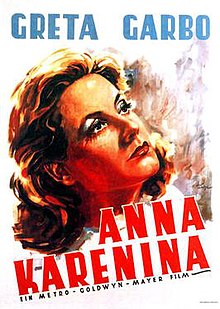Anna Karenina (1935 film)
| Anna Karenina | |
|---|---|

1935 German Theatrical Poster
|
|
| Directed by | Clarence Brown |
| Produced by | David O. Selznick |
| Written by |
S. N. Behrman Clemence Dane Salka Viertel Leo Tolstoy (novel) |
| Starring |
Greta Garbo Fredric March Maureen O'Sullivan Freddie Bartholomew Basil Rathbone Reginald Owen |
| Music by | Herbert Stothart |
| Cinematography | William H. Daniels |
| Edited by | Robert Kern |
| Distributed by | Metro-Goldwyn-Mayer |
|
Release date
|
|
|
Running time
|
95 minutes |
| Country | United States |
| Language | English |
Anna Karenina is a 1935 Metro-Goldwyn-Mayer film adaptation of the novel Anna Karenina by Leo Tolstoy and directed by Clarence Brown. The film stars Greta Garbo, Fredric March, Basil Rathbone and Maureen O'Sullivan. There are several other film adaptations of the novel.
In New York, the film opened at the Capitol Theatre, the site of many prestigious MGM premieres. The film earned $2,304,000 at the box office, and won the Mussolini Cup for best foreign film at the Venice Film Festival. Greta Garbo received a New York Film Critics Circle Award for Best Actress for her role as Anna. In addition, the film was ranked #42 on the American Film Institute's list of AFI's 100 Years... 100 Passions.
Anna Karenina (Greta Garbo) is the wife of Czarist official Karenin (Basil Rathbone). While she tries to persuade her brother Stiva (Reginald Owen) from a life of debauchery, she becomes infatuated with dashing military officer Count Vronsky (Fredric March). This indiscreet liaison ruins her marriage and position in 19th century Russian society; she is even prohibited from seeing her own son Sergei (Freddie Bartholomew), with eventual dire results.
Writing for The Spectator in 1935, Graham Greene made much of Greta Garbo's powerful and theatrical acting in the film, noting that "it is Greta Garbo's personality which 'makes' this film, which fills the mould of the neat respectful adaptation with some kind of sense of the greatness of the novel". Green found that the pathos that Garbo's acting brings to the picture overwhelms the acting of all supporting cast save that of Basil Rathbone.
...
Wikipedia
